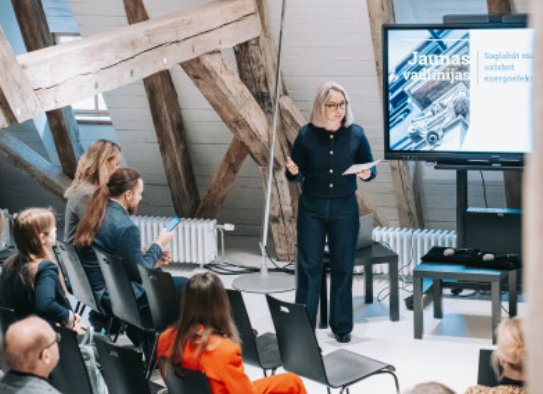News
Recent News
BIS User Support: Stronger Engagement and Growing Satisfaction in 2025
Published Friday, 20 February 2026Join the 2026 BIS User Survey and share your feedback on the BIS Chat!
Published Monday, 16 February 2026Construction growth driver in 2025 – civil engineering
Published Friday, 13 February 2026Webinars on Common Mistakes and Recommendations in the Renovation of Multi-Apartment Buildings
Published Thursday, 05 February 2026VNĪ develops energy efficiency guidelines for historic buildings
 Published
Friday, 31 October 2025
Published
Friday, 31 October 2025
State Real Estate (VNĪ) has developed new “Guidelines for Improving Energy Efficiency in Cultural Heritage Buildings”, which will help owners, architects, and property managers plan building renovation wisely—preserving cultural and historical value while ensuring the sustainable use of energy resources.
“Energy efficiency in historic buildings is not merely a technical matter – it’s a shift in mindset. We need to view a building as a system, in this case a historic one, where it’s crucial to maintain balance between heritage preservation and modern climate and energy efficiency solutions. Only in this way can we ensure that our heritage is preserved for future generations, while its use and comfort meet today’s standards,” emphasizes VNĪ Board Member Andris Vārna.
The guidelines serve as a practical tool to move away from a fragmented “patch-on-patch” approach toward a systemic, data-driven method of property management. They provide recommendations for assessing the technical condition of buildings and for implementing energy efficiency measures using appropriate technologies without affecting the building’s historic substance. The document compiles VNĪ’s experience and international best practices and includes examples from national property renovation projects, such as the reconstruction of the Riga Castle castella.
In the context of heritage conservation and construction, there has been extensive discussion about climate change and environmental degradation. Europe has embedded instruments in its policies that pave the way toward becoming the first climate-neutral continent. However, outside the circle of cultural heritage experts, there is still a lack of knowledge on how to maintain the right balance between monument protection and the implementation of Green Deal measures—promoting the sustainable preservation of cultural heritage sites.
“These guidelines are an important first step toward providing the wider public with information on the opportunities and solutions for restoring cultural monuments in line with Europe’s climate neutrality requirements, demonstrating that cultural heritage can be energy efficient throughout its entire life cycle,” notes Ināra Bula, Head of the National Heritage Board.
The guidelines were presented at the event “Preserving Heritage, Improving Energy Efficiency: New Guidelines” held on October 30 in the attic hall of the Museum of Literature and Music. During the event, VNĪ experts Agita Briede, Jānis Kļaviņš, and Kārlis Zeiberts introduced the structure and practical application of the document. A discussion on balancing heritage preservation and energy efficiency featured experts Ināra Bula, Pēteris Blūms, Kristīne Zīverte, Artūrs Lapiņš, and Jānis Kļaviņš, moderated by Dāvis Barbars.
The participants agreed that a sustainable approach to cultural heritage buildings is only possible through close cooperation between architects, engineers, and heritage conservationists. In this context, energy efficiency is not a compromise but rather a means of extending the lifespan of buildings and reducing maintenance costs.
The guidelines are available online on VNĪ’s website:
🔗 https://ej.uz/vni_vesturisko_eku_energoef_paaugstinasana
About VNĪ
State Real Estate JSC (VAS “Valsts nekustamie īpašumi”) is currently implementing 110 projects with total investments of €410 million. VNĪ provides professional property management and administration for 411 building and structure properties, comprising 979,000 m² of building area, land under buildings totaling 6.27 million m², and 3,203 land properties with a combined area of 8.94 million m².
In 2024, VNĪ received the Platinum Award of the Corporate Responsibility and Sustainability Institute’s Sustainability Index for the fourth time, confirming the company’s consistently high level of governance and operational sustainability. The company was founded in 1996, and its sole shareholder is the Ministry of Finance of the Republic of Latvia.